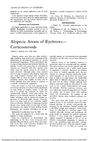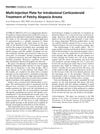 40 citations,
July 2007 in “Dermatologic Therapy”
40 citations,
July 2007 in “Dermatologic Therapy” Systemic glucocorticosteroids are a primary treatment for various skin conditions but require careful management due to potential side effects and relapses.
[object Object]  35 citations,
May 2012 in “Expert Opinion on Pharmacotherapy”
35 citations,
May 2012 in “Expert Opinion on Pharmacotherapy” The document concludes that there are various treatments for different types of alopecia, but more research is needed for evidence-based treatments.
 17 citations,
August 2015 in “Expert Opinion on Pharmacotherapy”
17 citations,
August 2015 in “Expert Opinion on Pharmacotherapy” The document concludes that oral finasteride and topical minoxidil are effective for genetic hair loss, while other treatments for different types of hair loss show promise but need more research.
 10 citations,
January 2014 in “Journal of Mid-life Health”
10 citations,
January 2014 in “Journal of Mid-life Health” Menopause can cause skin issues, and seeing a dermatologist helps.
 June 2019 in “Journal of evolution of medical and dental sciences”
June 2019 in “Journal of evolution of medical and dental sciences” Dermoscopy is useful for tracking alopecia areata treatment, with yellow dots and new vellus hairs being good indicators of hair regrowth.

Different scalp and hair disorders are more common in certain ethnic groups, with the most common being androgenetic alopecia, which is treated with medications like minoxidil and finasteride.
 4 citations,
September 2011 in “Expert Review of Dermatology”
4 citations,
September 2011 in “Expert Review of Dermatology” Various treatments exist for alopecia areata, but none are completely satisfactory; choice depends on age, disease extent, and preference.
 October 2018 in “InTech eBooks”
October 2018 in “InTech eBooks” The most effective treatments for hair loss are minoxidil, finasteride, PRP, and hair transplants, with steroids and immunosuppressants for autoimmune types.
 47 citations,
December 2020 in “Journal of the European Academy of Dermatology and Venereology”
47 citations,
December 2020 in “Journal of the European Academy of Dermatology and Venereology” The document concludes that understanding and treating hair loss requires recognizing its various types and using appropriate diagnostic tools and treatments.
 37 citations,
May 2016 in “Deutsches Arzteblatt International”
37 citations,
May 2016 in “Deutsches Arzteblatt International” Hair loss requires customized treatments based on its various causes and types.
 22 citations,
February 2002 in “Clinics in Geriatric Medicine”
22 citations,
February 2002 in “Clinics in Geriatric Medicine” Many elderly women experience unwanted facial hair and various hair loss conditions, with treatments available for each condition.
 5 citations,
August 2003 in “British Journal of Dermatology”
5 citations,
August 2003 in “British Journal of Dermatology” Iron deficiency might contribute to hair loss in women.

research Acne
4 citations,
January 2019 Acne is a common skin condition that can be influenced by diet, lifestyle, and hormones, and requires a treatment approach that includes psychological considerations.
 January 2019 in “Springer eBooks”
January 2019 in “Springer eBooks” Acne can appear or persist in adulthood due to hormonal changes, external factors, or substance use, and requires appropriate treatment.
 May 2023 in “Journal of Clinical Medicine”
May 2023 in “Journal of Clinical Medicine” New understanding and treatments for hair loss are improving, but more research is needed.
 11 citations,
January 1961 in “Archives of dermatology”
11 citations,
January 1961 in “Archives of dermatology” Corticosteroid injections helped eyebrow hair regrow in men with alopecia areata.
 1 citations,
January 2015 in “Springer eBooks”
1 citations,
January 2015 in “Springer eBooks” The document says a skin condition called alopecia areata causes hair loss and stress, and is treated with strong skin creams, injections, or other therapies, but treatment success varies.
 16 citations,
July 2000 in “Dermatologic surgery”
16 citations,
July 2000 in “Dermatologic surgery” The multi-injection plate is a less painful and more efficient method for treating patchy hair loss.
[object Object]  16 citations,
January 2015 in “Current problems in dermatology”
16 citations,
January 2015 in “Current problems in dermatology” Alopecia Areata is an autoimmune hair loss condition that needs more research for better treatments.
 238 citations,
July 2003 in “British Journal of Plastic Surgery”
238 citations,
July 2003 in “British Journal of Plastic Surgery” Hidradenitis suppurativa, a chronic skin disease, can be managed with antibiotics, lifestyle changes, and in severe cases, surgery. Early diagnosis and careful planning are key, and laser treatment can be an efficient solution for mild to severe cases.
 101 citations,
November 1992 in “Archives of Dermatology”
101 citations,
November 1992 in “Archives of Dermatology” Steroids help hair regrowth, and minoxidil slows post-steroid hair loss, but effects are temporary.
 3 citations,
January 2008 in “Actas dermo-sifiliográficas/Actas dermo-sifiliográficas”
3 citations,
January 2008 in “Actas dermo-sifiliográficas/Actas dermo-sifiliográficas” Early diagnosis and treatment of Hidradenitis Suppurativa are important to prevent serious physical and mental effects.
 1 citations,
April 2022 in “The Egyptian Journal of Hospital Medicine ”
1 citations,
April 2022 in “The Egyptian Journal of Hospital Medicine ” Fractional laser therapy may help regrow hair in alopecia areata.
 April 2024 in “Medical & clinical research”
April 2024 in “Medical & clinical research” More research is needed to find the best long-term treatments for Alopecia Areata.
 122 citations,
November 1984 in “Journal of the American Academy of Dermatology”
122 citations,
November 1984 in “Journal of the American Academy of Dermatology” No single treatment is consistently effective for alopecia areata, and more research is needed.
 84 citations,
April 2005 in “Dermatologic Clinics”
84 citations,
April 2005 in “Dermatologic Clinics” Treatments for melanin disorders exist, but more effective options needed.
 67 citations,
January 2022 in “Theranostics”
67 citations,
January 2022 in “Theranostics” Advanced nanocarrier and microneedle drug delivery methods are more effective, safer, and less invasive for treating skin diseases.
 55 citations,
October 2003 in “Dermatologic Clinics”
55 citations,
October 2003 in “Dermatologic Clinics” Different hair care practices and conditions affect African American hair and scalp health, requiring specialized knowledge for treatment.
 46 citations,
January 2015 in “Pediatric Rheumatology”
46 citations,
January 2015 in “Pediatric Rheumatology” Skin symptoms are important for diagnosing and managing juvenile-onset systemic lupus erythematosus and usually get better with treatment.
 43 citations,
September 2012 in “International Journal of Dermatology”
43 citations,
September 2012 in “International Journal of Dermatology” Hormonal therapies are safe and effective for treating adult women's acne.






























